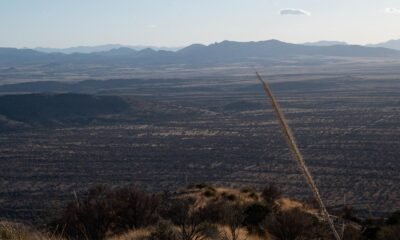arizona
Conservationists Urge Immediate Halt to ‘Cyanide Bombs’ in National Forests

An environmental coalition is urging the U.S. Forest Service to ban the use of cyanide bombs, citing the traps’ potential to harm endangered species and pose risks to humans. This call for action comes nearly a year after the Bureau of Land Management enacted a ban on the devices, largely due to pressure from the Center for Biological Diversity, Predator Defense, and over 60 other conservation groups.
The M-44 traps, which contain sodium cyanide, are designed to kill predators like coyotes when triggered. A lethal dose is ejected into the animal’s mouth within minutes. Brooks Fahy, executive director of Predator Defense, emphasized the urgency of the ban, highlighting decades of unnecessary deaths of both wildlife and humans linked to these devices. “M-44s are indiscriminate devices that can never be used safely,” he stated, stressing the lack of justification for their continued use in managing native predator populations.
Despite public opposition, the U.S. Forest Service has reportedly kept the option open to authorize the traps again, though there has been no usage on its lands since 2021. A Forest Service spokesperson confirmed that Secretary of Agriculture Thomas Vilsack’s statement about this remains unchanged.
The coalition’s petition references alarming statistics from the U.S. Fish and Wildlife Service, noting that M-44s have killed approximately 6,000 to 7,500 animals annually since 2015. In 2023 alone, the devices were responsible for the intentional killing of 6,148 coyotes, alongside other fox species, and 156 unintended animal deaths.
Since 1978, several instances of endangered species deaths linked to cyanide bombs include grizzly bears and California condors. The devices have also harmed humans, with 42 cases reported between 1984 and 2015. One incident tragically involved a Utah man whose exposure to a cyanide bomb contributed to his later death.
Some states, responding to the dangers, have moved to restrict the use of M-44 devices. Oregon implemented a complete ban in 2020, while restrictions are in place in Colorado, Wyoming, and Idaho. Arizona has also enacted limitations on their usage. However, states such as Montana, Nebraska, and Texas continue to permit M-44s, with Texas reporting the highest usage levels.
In Congress, lawmakers have initiated efforts to outlaw these devices on public lands. Proposed legislation, known as Canyon’s Law, was introduced last summer but has not advanced significantly. Inspired by the experience of Canyon Mansfield, a 14-year-old who set off a cyanide bomb and lost his dog, the legislation seeks to prevent similar incidents.
Collette Adkins from the Center for Biological Diversity is among those calling for the Forest Service to prioritize safety in national forests. “The Forest Service needs to step up with a ban so that we all can safely step in our national forests,” she argued, lamenting the agency’s reluctance to follow the lead of other land managers who recognize the dangers posed by such devices.


















